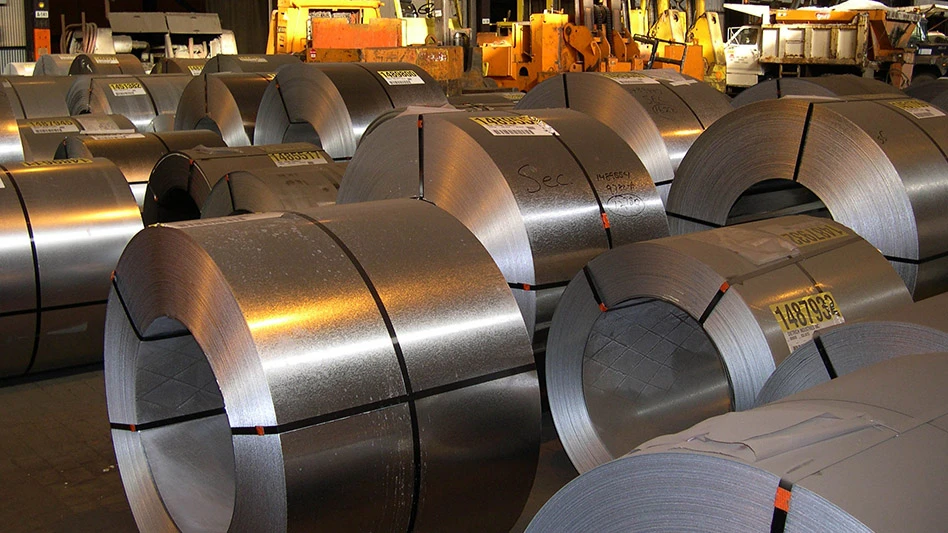
Photo courtesy of United States Steel Corp.
The Pittsburgh-based United Steelworkers (USW) has criticized United States Steel Corp., also based in Pittsburgh, for its reported decision to idle indefinitely a blast furnace operation in Granite City, Illinois.
“U.S. Steel’s decision to idle steelmaking at Granite City Works once again demonstrates its callous disregard for its dedicated workforce, who for generations have served as the backbone of the company’s success,” USW International President David McCall says in a news release about the company's decision.
“Our union consistently invites all our employers, including U.S. Steel, to fight alongside us to protect our domestic industries, but rather than invest in the future, U.S. Steel instead keeps turning its back on its highly skilled union workforce and their communities.”
He says this trend also includes U.S. Steel’s choice to begin laying off hundreds of workers at UPI in Pittsburg, California, this year and the winding down of U.S. Steel’s Lone Star Steel operations. Although that Lone Star, Texas, complex used EAF technology and was located in the South, much of its workforce was represented by the USW.
During that same time frame, U.S. Steel acquired nearly half of EAF producer Big River Steel for a reported $700 million in 2019 and then agreed to buy the remaining portion for another $774 million in late 2020.
In 2022 and 2023, the steelmaker issued a combined $530 million in “green bonds” to help pay for its project to double EAF capacity at the predominantly non-union complex in Arkansas.
In September, U.S. Steel President and CEO David B. Burritt made an initial announcement about the idling of the Granite City furnace referring to the condition as temporary and tied to a labor-management dispute between the United Auto Workers (UAW) union and automakers Ford, General Motors and Stellantis that lasted about six weeks.
“The company’s clumsy attempt earlier this year to pit workers against each other by blaming changes at Granite City on the auto workers’ strike further demonstrates its cynical and opportunistic view of American labor,” UAW District 7 Director Mike Millsap says.
The friction between U.S. Steel and the USW contrasts with the approach taken by the United States’ only other blast furnace operator, Cleveland-Cliffs.
Cliffs and its President and CEO Lourenco Goncalves forged a partnership with the USW this August to secure the union’s backing for a Cleveland-Cliffs bid to acquire U.S. Steel.
About one year earlier, upon Cliffs and the USW signing a four-year agreement, Goncalves was highly complimentary of the USW and its workforce. “Our workforce has made these past two years possible, including navigating a monumental transformation and growth, overcoming the challenges of a pandemic and adapting to an ever-changing business climate,” he said in October of last year. “Going forward, we will continue to promote our employees’ well-being as the basis of our success, for the benefit of our clients and our long-term shareholders.”
For its part, U.S. Steel has for several years portrayed its divestments in blast furnace technology and investments in Big River Steel as critical decarbonization steps and as part of a strategy to make steel to serve niche but growing markets.
In remarks accompanying a highly profitable quarter in 2021, Burritt commented, “We are confident in the long-term value our new, highly capable minimill will create as it further expands our competitive advantage to produce sustainable and differentiated steel. We are getting better, not bigger, by building on our Mini Mill segment’s industry-leading performance to create a business model that will continue to reward stockholders into the future.”
Two years later, Millsap says, “As we look to the future of the U.S. steel industry, the USW intends to draw on every resource we have available to ensure our members—in Granite City and across the country—are treated with the dignity and respect they deserve.”
Latest from Recycling Today
- BMW Group, Encory launch 'direct recycling’ of batteries
- Loom Carbon, RTI International partner to scale textile recycling technology
- Goodwill Industries of West Michigan, American Glass Mosaics partner to divert glass from landfill
- CARI forms federal advocacy partnership
- Monthly packaging papers shipments down in November
- STEEL Act aims to enhance trade enforcement to prevent dumping of steel in the US
- San Francisco schools introduce compostable lunch trays
- Aduro graduates from Shell GameChanger program





